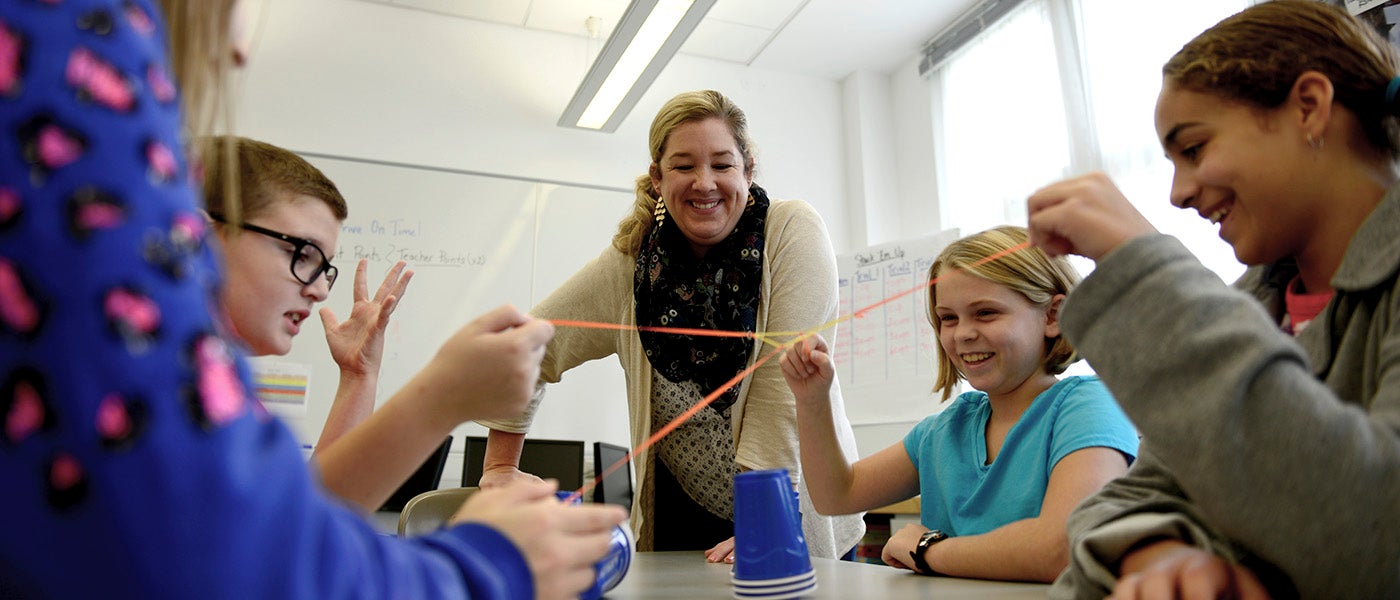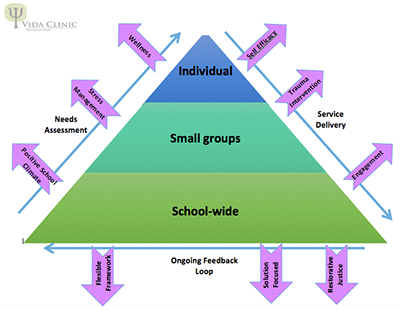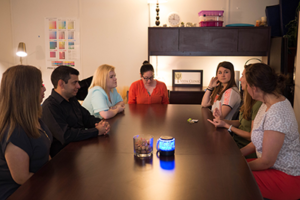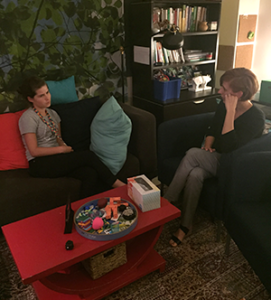
Healthy Educators for Healthy Kids
Inside this story:
- The influence of student mental health on academic performance is undeniable, but addressing the mental health needs of students can be challenging for teachers who often react with exclusionary disciplinary practices.
- Teachers and faculty need support to appropriately and effectively address the needs of students and the root causes of their behaviors.
- In 2014, the Hogg Foundation funded a collaboration between the Austin Independent School District and Vida Clinic to promote a culture of sensitivity for children who are distressed, and to promote awareness and wellness among faculty.
- The staff at Vida Clinic provides individualized, confidential, solution-focused consultation services for teachers at Crockett High School.
- With a trauma-informed approach, Vida Clinic has established a campus-based mental health system that includes intervention and wellness.
%
Students Likely to have Experienced Trauma by Age 17
Saunders, B. E., & Adams, Z. W. (2014). Epidemiology of Traumatic Experiences in Childhood. Child and Adolescent Psychiatric Clinics of North America, 23(2), 167–184.
In order to address the student as a whole being—rather than a “problem”—it’s important to look at the education system and all of the players that influence a student’s mental health. Typically, teachers and faculty react with exclusionary disciplinary practices such as suspension, expulsion, placement in an alternative school, and even police involvement. These interventions remove the student from the classroom, but do not address the root cause of the behavior.
Researchers have suggested that when a teacher believes their student has control over his or her behavior, the teacher is more likely to become angry and use harsh punitive measures. However, in trauma cases the student is often not in control. Instead, Dr. Elizabeth Minne, licensed psychologist and executive director at Vida Clinic, says the end goal is for students who have endured psychological trauma or bad experiences to have satisfying learning experiences within the classroom.
She then describes how a campus psychologist and Austin Independent School District (AISD) social worker worked with her to “get through Friday.”
 Relationships with teachers are one of the single most common resources for children and may be a protective factor against risk for a range of negative outcomes. Teachers and faculty need support to appropriately and effectively address the needs of their students. Crockett High School and Vida Clinic, a local practice specializing in school-based mental health programs, want staff to feel more equipped to work through challenges in the classroom and reduce exclusionary disciplinary practices. Through a unique, multi-layered approach, Vida Clinic is raising awareness on how these behaviors fit in the context of the child’s life (such as chaotic home environments, inconsistent caregiving, and abusive or destructive family members).
Relationships with teachers are one of the single most common resources for children and may be a protective factor against risk for a range of negative outcomes. Teachers and faculty need support to appropriately and effectively address the needs of their students. Crockett High School and Vida Clinic, a local practice specializing in school-based mental health programs, want staff to feel more equipped to work through challenges in the classroom and reduce exclusionary disciplinary practices. Through a unique, multi-layered approach, Vida Clinic is raising awareness on how these behaviors fit in the context of the child’s life (such as chaotic home environments, inconsistent caregiving, and abusive or destructive family members).
In 2014, the Hogg Foundation awarded funds to a collaboration between Crockett High School and Vida Clinic to promote a culture of sensitivity for children who are distressed, and to promote awareness and wellness among teachers and faculty. Going beyond training, Vida Clinic created a program to help teachers nurture self-improvement, and real-life application of values and skills. Preliminary success has resulted in additional funds and the opportunity to expand services to Anderson High School.
Dr. Minne and the staff at Vida Clinic provide individualized, confidential, solution-focused consultation services for teachers at Crockett.
There are several key factors that make this pilot project a success.
A Three-Tiered Approach
 Vida Clinic’s approach is three-tiered and includes
Vida Clinic’s approach is three-tiered and includes
- Campus-wide talks based on issues the campus says are relevant (for example “trauma and the adolescent brain”);
- Small group work with teachers including a weekly mindfulness group to learn skills, get free lunch and build a sense of community; and
- One-on-one sessions with teachers.
Through this approach, Vida Clinic allows campuses to customize their program. They hope to expand to not only support teachers, but also students and parents as well. From there, teachers had the opportunity to bring in Dr. Minne’s team to observe their classroom and provide immediate feedback and ideas.
The Power of Small Group Intervention
 One-on-one work with teachers has its benefits, but bringing a few teachers together to work on issues can also be very powerful. Dr. Minne advises that the group has to be small enough that they can have quality interactions with each other and build skills. Vida Clinic runs a weekly staff mindfulness and stress management group for staff and teachers to learn “regulation skills” so that they can center themselves and be present to meet the needs of the kids. “We get a little check in. And then we do the breathing exercises or the visualization,” describes a teacher.
One-on-one work with teachers has its benefits, but bringing a few teachers together to work on issues can also be very powerful. Dr. Minne advises that the group has to be small enough that they can have quality interactions with each other and build skills. Vida Clinic runs a weekly staff mindfulness and stress management group for staff and teachers to learn “regulation skills” so that they can center themselves and be present to meet the needs of the kids. “We get a little check in. And then we do the breathing exercises or the visualization,” describes a teacher.
The group work with teachers is showing an increase in job satisfaction and retention.
Practical Tips and Skill Building
 In order to help teachers take these practical skills back to the classroom, Dr. Minne and her team create tip sheets to help teachers think through how to apply new skills in the classroom. The tip sheets follow a basic principle: in order for kids to learn, they need attachment, regulation and competency. Under each of these concepts, Vida Clinic provides practical skill-building opportunities for teachers.
In order to help teachers take these practical skills back to the classroom, Dr. Minne and her team create tip sheets to help teachers think through how to apply new skills in the classroom. The tip sheets follow a basic principle: in order for kids to learn, they need attachment, regulation and competency. Under each of these concepts, Vida Clinic provides practical skill-building opportunities for teachers.
These tip sheets are built on the Attachment, Regulation, and Competency (ARC) framework, an evidence-based practice used to treat trauma in adolescence.
Incorporating Student Voices
In addition to creating feedback loops with teachers, the Vida Clinic team also gathered insights directly from students, asking them to identify a teacher that inspired them and why, and what support they need from their teachers. The results were not only reassuring for teachers, but an unexpected consequence is that the team identified key teacher qualities that students say they need in order to learn well in the classroom, including a sense of humor, smiling, feeling safe and the ability to communicate with calm voices while avoiding yelling.
The results were distributed with very little “advice giving.” Staff liked hearing what they’re doing well and it empowered them to do that more. Teachers also noted that hearing how they impact students’ lives was empowering. “We received about 500 tributes from students at this school. We love how this project gives the students a positive voice in their campus culture,” says Dr. Minne.

Adaptive and Flexible
 All the resources provided at Crockett High School are voluntary. Teachers received a flyer at the beginning of the school year inviting them to participate in a 15-minute, solution-focused consultation. From there, teachers had the opportunity to bring in Dr. Minne’s team to observe their classroom and provide immediate feedback and ideas.
All the resources provided at Crockett High School are voluntary. Teachers received a flyer at the beginning of the school year inviting them to participate in a 15-minute, solution-focused consultation. From there, teachers had the opportunity to bring in Dr. Minne’s team to observe their classroom and provide immediate feedback and ideas.
Overall, the approach is less prescriptive, and more focused on listening and responding. For example, when a few kids were acting out, traditionally teachers would have called in the authorities, specifically campus police. Unsurprisingly, the fear from these encounters leads to heightened arousal in kids, not less. Instead, teachers asked if they could bring the school officers into a meeting with teachers and the Vida Clinic staff to talk about trauma-informed care. “We want the school communities to feel they’re building the change,” says Dr. Minne. By bringing different disciplines together in one room to collective solve issues, the school is creating a more cohesive, collaborative system of care for students.
A Culture of Change
Through the Vida Clinic and Austin ISD partnership, Crockett High School hoped to see the following short-term goals:
- Teachers report a greater sense of efficacy in the classroom.
- Staff reports greater awareness of connections between challenging behaviors and exposure to traumatic experiences in youth.
- Staff reports an improved sense of personal well-being.
To do this, Vida Clinic focused on creating a culture shift with the goal of encouraging staff to regulate theirselves first.
Through their trauma-informed approach to behaviors in schools, Vida Clinic has established a campus-based mental health system that includes intervention and wellness. It provides not only support for students, but also builds the capacity for the people in their lives to provide better support.
“We’ve created a culture of acceptance and awareness of mental health and mental health care,” says Dr. Minne.
RELATED CONTENT
Research has found a strong link between untreated trauma and negative outcomes and behavioral issues in schools. Throughout the education system, there is a growing interest in widening the use of proactive, trauma-informed, equity-driven approaches that lead to more positive behavioral outcomes.
Texas schools often resort to punitive measures that alienate kids from school and feed the “school-to-prison” pipeline. Addressing mental health in schools fosters a climate that is healthier for kids, more supportive of teachers, and lowers costs to the state — what we pay in dropouts and future incarceration — over the long run.
Dr. Marilyn Armour, director of the Institute for Restorative Justice and Restorative Dialogue, is our guest for this episode of the podcast. She explains why Restorative Discipline and its philosophical underpinning, restorative justice, is starting to catch on in Texas, and ways that the approach can be implemented.
